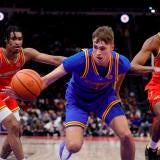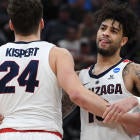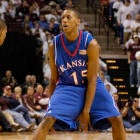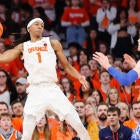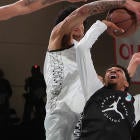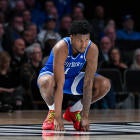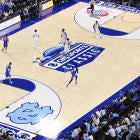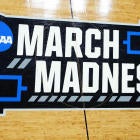ANAHEIM, Calif. – In Saturday's Elite Eight matchup between Gonzaga and Texas Tech, something's gotta give.
No. 1seed Gonzaga has the single most impressive offense in college basketball this season. Its offensive rating, scoring an average of 125.0 points per 100 possessions this season, ranks No. 1 on KenPom.com. The Zags have scored 100 points on its opponents in seven games this season.
No. 3 seed Texas Tech, on the other hand, has boasted the single most impressive defense in college basketball this season. Its defensive rating, allowing an average of only 84.4 points per 100 possessions this season, ranks No. 1 on KenPom.com, and is tied for the same defensive rating as the 2014-15 Kentucky team that went 38-1. No team in college hoops has posted a better defensive rating than that over the past decade. It was on display in Thursday's Sweet 16 victory vs. Michigan, where Texas Tech limited the Wolverines to only 44 points. That was 10 points fewer than Michigan's previous lowest-scoring game of the season – and typical of Texas Tech's defense, who have held opponents to nearly 25 points under their average scoring output.
This Elite Eight game will be the college basketball version of Newton's Third Law of Motion: When two equal and opposite forces meet at the Honda Center in the West Regional finals, one force has got to give.
But which one?
Texas Tech's defense is aggressive and physical, turning over teams at a rate that ranks 11th in college hoops; 23.1 percent of the Red Raiders' defensive possessions end in their opponent turning the ball over. Their team mantra is an old quote from golfer Ben Hogan: "The secret is in the dirt." What that means is their secret ingredient isn't any special defensive scheme, isn't about recruiting the very top players; it's about working harder than their opponent, both on the court and off.
At the pre-Elite Eight press conference on Friday afternoon, senior guard Matt Mooney, who is a graduate transfer from South Dakota, was wearing a T-shirt that read, "Never lose your chip." Sure, they're clichés – but they are clichés that Texas Tech's players have bought into from Day One.
"We have a lot of guys who aren't five-star guys," Mooney said when I asked him about the team identity that's behind those slogans. "The coaching staff, coach (Chris) Beard, who came from a mid-major, who started out coaching random teams and has worked his way up. A lot of our guys are the same way. We just try to embrace that. We weren't the highest-recruited guys, but that doesn't mean we can't compete with the best in the country."
After smothering Michigan on defense in the Sweet 16, senior wing Brandone Francis had a pretty succinct explanation for Texas Tech's performance: They wanted it more. It was hard to argue with that. They were aggressive from the tip, getting in the face of Michigan on the perimeter and playing them physical down low, forcing the Wolverines into a woeful 1-of-19 from beyond the arc as well as 14 turnovers. It's a defense-first culture that Beard focused on creating from the moment he took the job three years ago.
"We try to recruit guys that understand: You are gonna play defense, we're gonna coach you, we're gonna hold you accountable," Beard said. "We do a lot of listening in recruiting, not just talking. Players will tell you what they want. Guys who are talking about me me me, the shots and the ball – not so much with us, they don't really succeed with us. Guys that want to win, guys that want to guard, guys that understand (what we do) – a great example of that is Zhaire Smith, a guy who goes from being a non-top-100 recruit to the 16th pick in the drafted."

"Defense is just who we are," Beard continued. "It's in our DNA."
Not to say that Texas Tech can't score. Sophomore Jarrett Culver, the Big 12 Player of the Year, has been an offensive force, with his season averages of 18.9 points, 6.4 rebounds and 3.8 assists vaulting him into the conversation as a potential top-five pick in the 2019 NBA Draft.
Just like Texas Tech is still a more-than-able offensive team, this Gonzaga team that's known for efficient scoring is plenty skilled on the defensive end, as they proved in the first three games of the tournament. ("Gonzaga plays defense, man," Beard marveled. "I'm telling you: It might not be their identity, but they are hard to score against. So many late shot-clock possessions. You gotta go get a basket if you're gonna beat Gonzaga.") Gonzaga ranks 13th in the nation in defensive efficiency. They're a complete team – only five other teams rank in the top 15 in both offensive and defensive efficiency – but it's the offensive end that comes more naturally to this group.
"Our offense has been stellar all year long, but that hasn't been the case for our defense," said sophomore wing Corey Kispert. "From beginning to end we've had to work really hard to get our defense to the level we want it to. It's been a slow process, a slow build up to this point."
The Gonzaga offense is one of the more beautiful offenses to watch in college basketball: Smooth and loose, with lots of movement of the players and of the ball. Its bread-and-butter has long been the high-low offense – bringing the ball in through the high post and working it down to the low post – but that's not always been the case. Early in Few's tenure he was a proponent of the flex offense, which puts and emphasis on the versatility of players, then he migrated toward the motion offense, which uses lots of movement off the ball and lots of cutting to maximize a team's quickness. More recently he's been using more ball screens, but it's always been with a basis in the high-low – and with a level of offensive flow and freedom that can be rare in the sometimes-clunky sport of college hoops.
"It first came from watching some of our older teams," Few explained when I asked about the lineage of his offensive philosophy. "I was a young assistant at Gonzaga, and we were pretty rigid, pretty tight, look at the bench a lot after a missed shot or a mistake. I always thought, 'If I ever become a head coach, I want my guys to play with a bunch of confidence and a bunch of freedom.' Just drill them down in practice so they know what to look for and what to expect and how to react, and once we get to the game, just let it rip. Those are the hardest teams to guard."
This year, on those principles and with the perfect players to execute them, Gonzaga has statistically been the hardest team in college basketball to guard. But now they face Texas Tech, the best team in college basketball at guarding. The Elite Eight game on Saturday will be a case of strength versus strength – and a test case of the state of which philosophy works best in today's college basketball.







